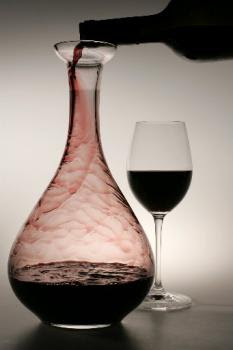It's been too long since I've written a more educational post. So here goes....
Have you ever wondered why we decant certain wines or what decanting even means?
Me too. Luckly, I've been a good student and will try to share what I learned with you. If you'd like to know more than what I'm sharing, just comment below and I'd be happy to elaborate.
What is decanting? And why do we do it?
Decanting is simply a way to accelerate the aging of wine. For example, when we have a "young" red wine, we need to let it breath so all that harsh alcohol taste can easy out. This is also the same reason we like to hold a red wine glass in our palm. (To warm it up and evaporate some of the harsh alcohol flavors.) Like the picture above illustrates, decanting is simply pouring the wine into a decanter. Decanters can be purchased a wine shops or many other store. But anything that can allow the wine to "open up" and come in contact with as many molecules of oxygen as possible is fine. I have a glass lemonade pitcher that I use.
What are tannins?
By now you've probably tried a wine that flat out dried out your mouth. Was it bitter and harsh? Did you crave a glass of water afterward? Did you wonder what was in the wine that caused that reaction? Those were tannins. These are found in grape skins, grape seeds, grape stalks, and are even leaked out from the oak barrels in which many wines age.
Some of that aggressiveness slips away when you eat something fatty like cheese while you drink. A great similarity was drawn by my professor in our textbook. Basically, he asked if you had ever had a strong black tea or green tea. And if so, did you add cream or milk to your beverage? You may not have known it but by adding cream or milk, you dimmed the effects of the tannins with the fat contained in it.


No comments:
Post a Comment